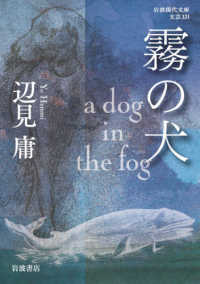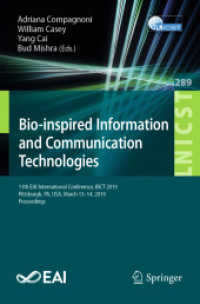- ホーム
- > 洋書
- > 英文書
- > History / World
Full Description
Although there is a rich historiography on Enlightenment Tuscany in Italian as well as French and German, the principle Anglophone works are Eric Cochrane's Tradition and Enlightenment in the Tuscan Academies (1961) and his Enlightenment Florence in the Forgotten Centuries (1973). It is high time to revisit the Tuscan Enlightenment. This volume brings together an international group of scholars with the goal of putting to rest the idea that Florence ceased to be interesting after the Renaissance. Indeed, it is partly the explicit dialogue between Renaissance and Enlightenment that makes eighteenth-century Tuscany so interesting. This enlightened age looked to the past. It began the Herculean project of collecting, editing, and publishing many of the manuscripts that today form the bedrock of any serious study of Dante, Petrarch, Boccaccio, Machiavelli, Vasari, Galileo, and other Tuscan writers. This was an age of public libraries, projects of cultural restoration, and the emergence of the Uffizi as a public art gallery, complemented by a science museum in Peter Leopold's reign whose relics can still be visited in the Museo Galileo and La Specola.
Contents
Introduction: Tuscany and Enlightenment in the Atlantic World Part I: The Politics of Knowledge in Enlightenment Tuscany 1. The Enlightenment at Work: Ideology, Reform, and a Blueprint for a Constitution 2. The Politics of Libraries Under the Habsburg-Lorraines 3. The Economics of Healthcare and the Tuscan Medical Enlightenment 4. From the Body to the Body Politic: Peter Leopold's Florentine Enlightenment State Part II: Commerce and the State 5. Carlo Ginori and the Modernization of the Tuscan Economy 6. Commercial Crisis in Livorno and the Remaking of the Tuscan Hinterland 7. Forests, Woods, Roads: Agricultural Landscapes as Instruments for the Material Administration of an Eighteenth-Century Tuscan Periphery Part III: History, Culture, and Enlightenment 8. Long After the Trial: Galileo's Rediscovery, Florentine Nostalgia, and Enlightened Passions 9. Making Renaissance Art Florentine 10. "Twenty Magnificent Temples of the Arts": Geographic Schools in the Uffizi Gallery. Epilogue: The Encyclopedic Prince: Grand Duke Peter Leopold (1747-1792) and the Meaning of Tuscan Enlightenment








